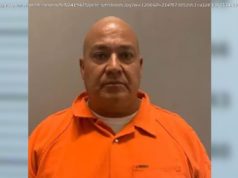The Iowa House is set to consider a bill that would allow those convicted of first degree murder to be put to death by lethal injection.
The Iowa House of Representatives is set to consider a bill that would allow those convicted of first degree murder to be put to death by lethal injection, potentially reversing a half-century-old ban on capital punishment in the state.
The House proposal, which is scheduled to get its first hearing Thursday, is much broader than a Senate version of the bill, which would apply only to those convicted of kidnapping, sexually abusing and killing a minor.
“It seems like some crimes are violent and vicious enough that the perpetrators should not have the right to breathe,” said the bill’s author, Rep. Clel Baudler, a Republican from Greenfield and chairman of the House Public Safety Committee. “It should send a message to society that we’re not going to tolerate this kind of behavior.”
Baudler said he believes the death penalty should be applied in cases like the 2016 ambush shootings of Urbandale Police Officer Justin Martin and Des Moines Police Sgt. Anthony “Tony” Beminio.
He pointed also to Judge Rosemarie Aquilina who told former USA Gymnastics team doctor Larry Nassar that she “just signed (his) death warrant” as she sentenced him to 40 to 175 years in prison last week in Michigan for molesting young athletes.
“The audience in the courtroom clapped,” Baudler said. “So apparently it’s OK to hold a guy between 40 and 175 years and it’s a death warrant. Everybody thinks it’s OK. But if you say the state has a law that allows the death penalty, people get all squeamish. And I don’t have that in my bloodstream, I guess. It’s either right or wrong.”
Rep. Steven Holt, R-Denison, will lead the public subcommittee meeting on House Study Bill 569 Thursday morning. He said he has not made up his mind about whether he will vote to advance the legislation.
“I believe that there are heinous crimes in which the death penalty is warranted,” he said. “However, there’s also a lot of statistics that suggest maybe more minorities are impacted by this, which would not be appropriate. So I’m listening and hearing all the arguments, and I’ll make a decision at that time.”
The Iowa Senate is considering a similar bill, Senate File 335, which would allow the death penalty, but in far fewer circumstances.
Daniel Zeno, a lobbyist for the American Civil Liberties Union of Iowa, said his organization would oppose reinstating the death penalty in any form.
“We think the death penalty is inherently unconstitutional,” he said. “Too often, who gets the death penalty is determined by race, by geography…. There should be consequences for criminal acts. But in this case, we think there are other ways to do it.”
If either bill is approved, Iowa would become one of 32 states to permit the death penalty, according to the Death Penalty Information Center .
The state’s last execution was on March 15,1963, when Victor Harry Feguer, a federal inmate, was hanged for kidnapping and killing a Dubuque physician. President John F. Kennedy denied Gov. Harold Hughes’ 11th-hour bid for clemency.
Hughes signed legislation in 1965 that outlawed the practice.
A host of organizations have lined up in opposition to the House bill, including the Iowa Attorney General’s office, the Iowa chapter of the National Alliance on Mental Illness, the Iowa Coalition Against Domestic Violence and the Episcopal Diocese of Iowa. None has registered in favor of the bill, though many remain undecided
Tom Chapman, executive director of the Iowa Catholic Conference, said his organization opposes the bill from a moral perspective.
“The main reason we oppose it is it’s not necessary to protect society,” he said. “Here in Iowa we’ve got life in prison without parole for people who are convicted of first degree murder. If it’s not necessary to kill someone to protect society, we would prefer the state uses non-lethal means.”
Both Holt and Baudler have been vocal opponents of abortion; both said they do not see the death penalty as a violation of their pro-life positions.
“My faith informs me as a Christian that there are some situations in which, I believe, it is biblical that the death penalty is warranted in heinous crimes,” said Holt. “… I don’t believe there’s any hypocrisy between being pro-life, when you’re talking about an innocent unborn child, as opposed to someone who has committed a heinous crime.”
The bill is in its earliest stages and faces a long legislative road. But if approved, it would take effect in January 2019 and would apply to offenses committed after that date.
It authorizes the costs for two attorneys for indigent defendants who face the death penalty, and it directs the Iowa Supreme Court and the state public defender to set up structures and training systems to provide legal assistance in cases of capital punishment.
The legislation also would prevent the death penalty from being applied to children and to those who are mentally or intellectually disabled, and it would delay the death of pregnant women until after they give birth or until they are no longer pregnant.
Under the bill, state employees could object to participating in administering the death penalty. The state Supreme Court also would be required to review every case where the death penalty is applied to consider whether the punishment is excessive.
The Des Moines Register last polled on the issue of capital punishment in 2006. At that time, 66 percent of Iowa adults favored reviving the death penalty for certain crimes, and 29 percent opposed it.
Home
United States
USA — Criminal House bill would reverse a half-century-old ban on capital punishment in Iowa






![Czy Joe Biden ma szansę obrobić straty po debacie CNN? [OPINIA]](http://nhub.news/wp-content/uploads/2024/06/thumb7fa1ff25146ac9995e9686b2dcc7bb5e-100x75.jpeg)